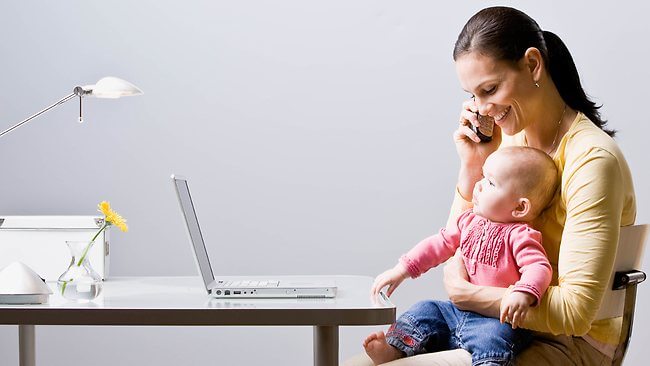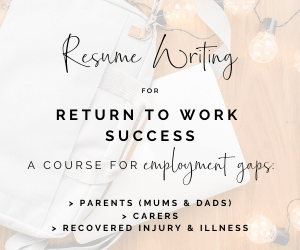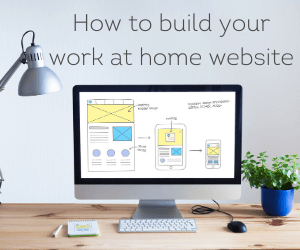Maternity leave – blink and you might miss it. With everything that goes on in the first months of having a new baby your maternity leave can sometimes feel extremely short. Most mums have mixed feelings when your leave is coming to an end and you are eyeing your return to work. But there are some things you can do to make it easier.
It is a good idea to get yourself organised for going back to work after maternity leave well in advance. Make sure you’ve planned out the logistics for your return, not just what is going to happen with your child while you’re at work but also what happens if your child is sick. Learn about your rights at work including returning to the same job and requesting flexible working arrangements. And if you have mixed feelings about returning to work, try to look at it as an opportunity to use the skills you’ve found in motherhood in your career.
Whether your decision to return to work after maternity leave is based on finances, the need for external stimulation or simply because your youngest child has become more independent, it is vital that this step in your life is carefully planned. As a working Mum, it is possible to sync your child’s needs with your work life and achieve a routine that makes your life relatively balanced and stress-free.
Getting Ready to Go Back to Work After Maternity Leave
There’s no way around it, returning to work is a juggling act. It’s a big transition, especially if it is your first baby. Sometimes returning to work comes earlier that you are ready for or is harder than you expect. But there are things you can do to help both you and your child adjust.
Make the decision
Make your own decision about when it’s right to return to work: The best advice on this will come from within. Every baby is different, and every mother is different. When the time is right, you will know so don’t set yourself any hard and firm rules. The timing on returning to work is also dependable on finances, what type of work you do and how much maternity leave your employer offers, so take that into consideration. You may find that you even have the option of easing back into things with a part-time role or job share to start.
You might find that you’re wanting to change jobs, or are looking again after an extended period of time off. If this is the case, it’s important to have confidence in your resume. If you’re worried about what the maternity leave gap has done to your career prospects, then our Resume Writing for Return to Work Success program may be for you.
Know your rights
It’s important to know what your rights are when returning to your job from maternity leave. On your return from parental leave you have the right to return to the same job you had before or if that position no longer exists, the nearest possible position in terms of status and pay (Fair Work Act 2009).
Your employer isn’t allowed to discriminate against you for your breastfeeding, caregiver status or family responsibilities. This means they can’t treat you less favourably than another employees for your breastfeeding status or family responsibilities.
Some employees, like parents returning to work after parental leave, have the right to request flexible working arrangements. Some examples of flexible working arrangements are changes to the hours of work (earlier or later start and finish times), patterns of work (such as job sharing) or locations of work (such as working from home). However, this doesn’t mean that the request will be granted, but employers can only refuse a request based on reasonable business grounds. You can find more information about requesting flexible working arrangements on the FairWork website.
Make compromises with your employer to create a workable solution: Remember that being a working parent is very different to working when you do not have a child. Speak to your employer about your circumstances and be completely honest with them to ensure you find a solution that works for the both of you. If you need a guide about what pay and conditions you should have in your employment, check out the pay and conditions tool by the Fair Work Ombudsman.
Work out the logistics
Returning to work means you need to figure out what is going to happen to you child during those hours. Will your partner be able to look after your child when you’re at work? Can the child’s grandparents help with care? Will you need to look at utilising paid day care? Make sure you explore this option early if you think you will use it as a lot of day care centres have waitlists, especially in city areas. If your child is starting school, you may need to use before or after school care to fit in with your work hours. Make sure you figure out what you need to be able to be stress free at work knowing your child is being looked after.
Before venturing back to the workforce ensure that you have carefully considered some back up support. Little ones who are new to day care or school seem to be more susceptible to illnesses and be unable to attend their new environment at times. A good support network of friends and family can be invaluable as you can help each other out when needs arise. Loving friends, relatives and especially grandparents, who love the children as much as you do, are often happy to pitch in and help at short notice. Nurture and appreciate these loving relationships as you will be glad of their support in the future.
Brainstorm how things will work out on a normal workday and come up with a plan. What time will you need to drop of your child and still make it to work on time? Will you need to express milk throughout the day and how will that happen? Are you or your partner making dinner? Planning things out will make the situation less stressful for everyone.
You may have been the only one looking after your little one most of the day and here you are about to start leaving them for full days with other people. As well as planning their bedding, lunch boxes etc it is also a good idea to factor in a bit of flexibility. Other people will not always do things ‘your way’ and the sooner you are happy to accept this the less agitated you will be when things do not always go to plan. What are you happy to be flexible about? And what are your non-negotiables? Thinking about these things in advance will enable you to feel more relaxed about the situation.
If you’re desperately in need of help, don’t be afraid to ask. There will come a time when you can repay the favour.
Do a childcare trial run
No matter what childcare solution you come up with, make sure you do a few trial runs to get it all sorted out. Do it at the same time of day you are going to be doing it when you actually go to work. You may find your plans change if you realise it takes longer to get to day care during peak hour, or getting your child ready to go. This also gets your child used to the new arrangements rather than on the first day your going back to work as well.
The added bonus to the trial runs is that you get a few hours to yourself to sort out everything you need, meet with your boss before officially returning, get your hair done in peace or just have a nap.

Go shopping
Chances are after having a baby, unless you’ve spent half your maternity leave on a rigorous exercise and food regime, you won’t fit into all your previous work clothes. Take some time to go shopping and find some pieces that fit well and make you feel great. This will give you great confidence returning to work, rather than adding to an already stressful first week and bursting into tears because you can’t zip up your skirt (that may be experience talking).
Take your baby to work
This may seem like an odd one, but if you’re returning to a previous place of employment take your baby in to see your colleagues. This will enable your co-workers to see your current reality and honestly, who can resist a cute bubba? If you’re child is a bit older it will also enable you to show them what mummy will be doing now when you are away from them and why.
Hopefully you have kept in touch with a few people at work and been involved in communications during your absence. When returning to work it is worthwhile reconnecting with your colleagues and finding out who may have joined the company.
Speak to your boss
Before going back, schedule a quick catch up with your boss, preferably over coffee so it’s more relaxed. Check in with what’s been happening at work and any changes you should be aware of. Discuss the priorities for your return so you know what you should be concentrating on and what to ignore. And discuss some flexible arrangements if that is what you want to work towards. Things such as working from home one day a week, or maybe an extra hour on some days to get half a day off each week.
Understand that more and more employers extend consideration to parents. Children get sick and things crop up that require your attention as a parent, and in this day and age, and increasing number of employers will accept and accommodation for this, but it’s good to have an open and honest discussion before you start back so you and your boss are working towards the same career goals for you.
Ditch the guilt
Returning to work is hard. There is a mix of emotions as you walk away from your child on that first day. Some may feel guilty others excited to be getting some time out. Every parent that has done it before you will tell you it does get easier. You can start to look forward to your days off where you can focus on having fun and adventures.
Often mothers feel extreme guilt when returning to work. This can be due to many factors, but common ones are when you feel you need to return to work before you are ready due to finances, or the flip side that you are wanting to return work for your own wellbeing. The best way to deal with guilt is to address it head on. Explain to your children (if they are old enough) and your partner why you feel it’s necessary for you to start working again and discuss what you plan on doing.
Some mums don’t feel guilty when they return to work. Some mums realise early on that stay at home mothering isn’t for them and recognise they will be a fantastic mum when they have a balance. So then, they feel guilty for not feeling guilty. They feel like the working mums have to say how guilty they feel to each other and indulge in the mutual sympathy that brings. Saying you don’t feel guilt – which is actually a great thing – is a bit of an anomaly, and those mums can worry that it doesn’t go down well.
No matter what you do as a parent these days, someone will always think it’s the wrong option. Remember that feeling guilty does no good. If you are doing what is best for you and your family, it will make for a happy and less stressed mum in the long run. If you’re organised and scheduling family time, you have nothing to feel guilty about, so just leave the guilt behind and enjoy the balancing act!
Get your partner to step up
Make your partner do more! When you’re a stay at home mum, everything regarding the home and kids tends to be lumped onto your shoulders. If you are deciding to head back to work, make sure your partner (if you have one) understands that they need to shoulder some of the responsibility now. And this doesn’t just mean doing a bit more housework, but the organisational baggage as well, such as organising what the kids need for the week ahead, meal planning etc.
If it is necessary for you to get a cleaner, nanny, babysitter or any other help, find someone you can really trust so you truly don’t have to worry about it while you’re at home.
Expect to get nothing done the first morning
Literally your first half an hour will be fielding questions about your new baby and how everything is going. The next hour will be trying to remember all the passwords to your computer and programs. You will then have about 10,000 emails to delete. Possibly around 2pm you may actually get some meaningful work done, but don’t expect to set the business world on fire on the first day back.
Don’t give up on your career
Yes that’s right you are still entitled to a career path. Just on different terms. So much has been written about how you career can end when you have children. So let’s buck this trend. You still need to factor in a performance review, salary review and generally have a feeling of progression within your career. If you instigate this first review, your boss will be impressed that you are thinking ahead, being conscientious and have interest in your career.
Understand that as a parent, you have skills that employers will LOVE. Think about all those times when you’ve had no choice but to master the art of multi-tasking and organisation! These are invaluable skills you as a parent bring to the workplace. Becoming a mum doesn’t have to mean giving up your career for good or never achieving your career goals and aspirations. With positivity, determination and the desire to make opportunity happen, you’ll surprise yourself at just how much you really can achieve for yourself as a mum and a working woman!

Change what you do with your bag
Before kids you may have just gotten into the care and put your bag on the front passenger seat next to you. However, a simple change to that routine is in order and that is to put your bag in the back seat with the baby seat. Why? Because when you’re sleep deprived and stressed by tying to get into your new normal of work and motherhood, your brain does weird things like revert to auto-pilot and driving straight from home to work without stopping at day care (especially if you have a quiet child). By putting your bag in the back seat with the baby, you’ll hopefully look back when you get it and never be able to forget your baby is there. Although unlikely, it is a simple trick that could prevent a tragedy.
Work through the emotions of the first few months
Getting into your new routine and finding your balance is hard. Sometimes it is completely overwhelming and all you’re thinking is “what am I doing?” The urge to quit and go back to being a stay at home mum can also be strong. The important thing to remember is that it is a transition process and the emotions you feel in the first few months may not last once you and your child settle into the new routine and things get a bit easier.
Resist the temptation in the first few weeks to just pack it all in. The stress of the first few months of going back to work aren’t really the time to make big life decisions about ditching your career. If you’re still feeling this way after three months, then it may be time to bust out a pros and cons list about continuing on or making some changes.
It’s a big deal adjusting to being back at work, particularly after your first child, so if you’re finding it all a bit challenging don’t worry it will get easier. By following these useful and practical tips, your decision on returning to work will be made with minimal stress and worry!
And on the days where it doesn’t go to plan? Be kind to yourself.






